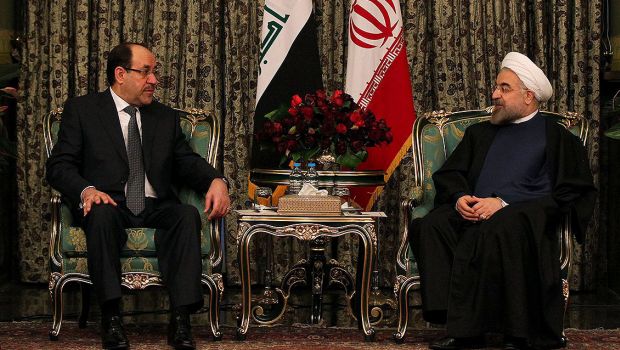
A handout picture released by the official website of the Iranian president shows the Islamic Republic’s President Hassan Rouhani (R) meeting with Iraqi Prime Minister Nuri Al-Maliki in Tehran on December 5, 2013. (AFP PHOTO/HO/PRESIDENT.IR)
Baghdad, Asharq Al-Awsat—Iraqi Prime Minister Nuri Al-Maliki arrived in Tehran on Wednesday on a two-day official visit, amid criticism of his trip from domestic opponents.
Maliki is scheduled to meet Iranian President Hassan Rouhani, Foreign Minister Mohammad Javad Zarif and the head of the Supreme Council of National Security, Admiral Ali Shamkhani, on Thursday. Maliki will also visit the Shi’ite holy city of Mashhad.
Iranian news agency IRNA said the Iraqi prime minister was invited to Iran to “discuss the development of bilateral relations in the economic and political fields.” The talks will also include the Syrian crisis, and the issue of the Iranian opposition group Mujahedin-e Khalq (MEK), which is based in Iraq.
The visit comes amid increasing division within the governing Shi’ite coalition in Iraq. It follows an announcement by the Sadrist Bloc in Iraq’s parliament, led by Moqtada Al-Sadr, and the Islamic Supreme Council of Iraq, led by Ammar Al-Hakim, of their intention to fight the next parliamentary elections on separate lists and open the door to new alliances in order to choose an alternative prime minister to Maliki.
Meanwhile, the State of Law Coalition, which Maliki leads, insisted on Maliki’s nomination for the premiership for a third term, a move rejected by the Sadrists and the Supreme Council.
Jawad Al-Jubouri, a member of the Sadrist Al-Ahrar Bloc, told Asharq Al-Awsat: “The visit may seem like a state visit by a senior official, such as a prime minister, who is working on Iraqi international relations, especially with neighboring states. However, the problem is in the timing of the visit, because carrying out two visits in close succession to two important countries, the United States and Iran, makes observers suspicious.”
Jubouri added that “when Maliki makes these visits under the pretext of discussing the region’s issues, such as the Syrian crisis and the Iranian nuclear dossier, he wants to show himself to these parties as a statesman capable of helping and dealing with these issues, enabling him to use the visit for electoral aims, whether to help him personally or help his party.”
He added: “These issues could disturb the internal equation, especially when we are all facing very important parliamentary elections, and when the issue of a third term sought by Maliki is the main issue of discussion.”
The National Dialogue Front led by Deputy Prime Minister Saleh Al-Mutlaq also expressed doubts about the visit. Spokesman Haydar Al-Mulla said in a news conference that “if the prime minister’s visit to Iran was to help support his quest for a third term, it is rejected, because the selection of the next prime minister should come from inside without external intervention.”
He added: “The political blocs are agreed that the next prime minister will be chosen by the Iraqi people, and must be accepted by all parties without the imposition of any outside agenda.”
Meanwhile, the Iraqi Parliament’s Foreign Affairs Committee said: “There must be a distinction between private party visits carried out by various parties and blocs to different countries, and state visits.”
Committee member Safiyah Al-Suhail told Asharq Al-Awsat that “senior officials’ visits, including by the prime minister, must be looked at from the point of view of the higher national interest, without other considerations.”
She added: “We in the Foreign Affairs Committee stress the importance of strengthening international relations, especially with Arab and Islamic neighbors, because the current circumstances in the region force us to open up to everyone and, therefore, we support the visit from that point of view.”
Suhail added: “There are those who see this visit as being linked to the elections, but I would like to point out that all parties and blocs make visits to various countries, and all seek support.”
Iraqi MP for the Kurdistan Alliance Bloc member, Mahdi Koshno, said: “This visit must be looked at as a state visit to normalize relations and, therefore, it has a positive dimension if it focuses on cultural and economic relations between the two countries, especially as Iran is an important country to Iraq.”
He added: “But if the visit only had political objectives, we see it as a disappointment.”
